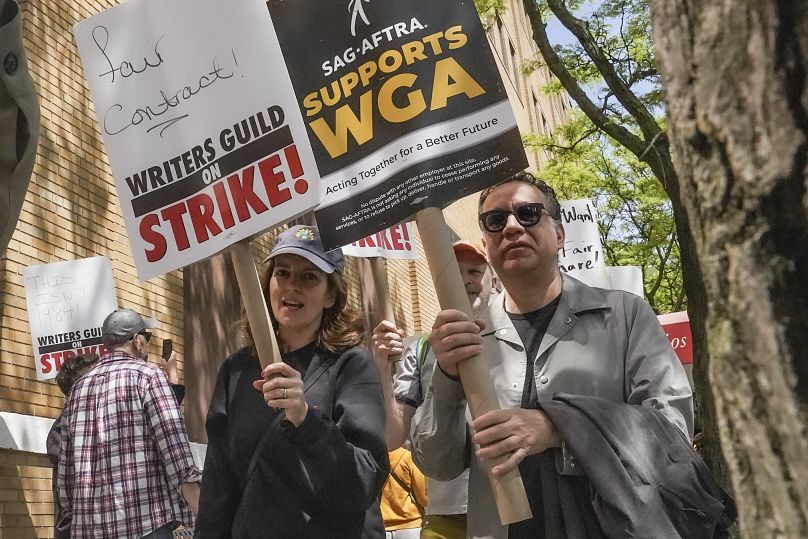Hollywood’s actors union was on the verge of striking after they couldn't agree on a deal with the studios.
The deadline for studios to negotiate a deal with Screen Actors Guild-American Federation of Radio and Television Artists (SAG-AFTRA) passed last night. SAG-AFTRA will now vote on whether to go on strike.
If they do, it will be in solidarity with the Writer Guild of America’s (WGA) multi-month long strike action against the Alliance of Motion Picture and Television Producers (AMPTP) for increasingly unfavourable conditions for the creatives behind films and TV shows in the US.
The SAG-AFTRA represents over 160,000 actors in the US. Later this Thursday, they will vote on strike action over losing out on money through residuals in the age of streaming. The subscription business model of streaming services like Netflix, which have taken over Hollywood, has made it increasingly difficult to fund a sustainable lifestyle as an actor, they say.
The complaints are similarly echoed by the WGA who have been on strike since 2 May. The WGA are concerned about the way streaming services have changed residual earnings, as well as the continued shrinking of contracts and potential of looking to AI for content.
Last-minute intervention was agreed upon between the SAG-AFTRA and federal mediators on Tuesday night, but a deal could not be made by the time the contract ran out Wednesday night.
Actors and writers against Hollywood money-men
If the SAG-AFTRA does strike, it will be the first time that both the SAG-AFTRA and the WGA will strike concurrently since 1960. Back then, Ronald Reagan was the president of SAG-AFTRA, two decades before he became US President.
The WGA strike has already impeded production on many films and TV shows in Hollywood. A dual strike including the actors union will effectively stall every production that is yet to film in the country.
SAG-AFTRA posted a new statement today stating that "over the past decade, your compensation has been severely eroded by the rise of the streaming ecosystem. Furthermore, artificial intelligence poses an existential threat to creative professions, and all actors and performers deserve contract language that protects them from having their identity and talent exploited without consent and pay. Despite our team’s dedication to advocating on your behalf, the AMPTP has refused to acknowledge that enormous shifts in the industry and economy have had a detrimental impact on those who perform labour for the studios."
"Though we’ve engaged in negotiations in good faith and remained eager to reach a deal that sufficiently addressed performer concerns, the AMPTP’s responses to our proposals have not been adequate," Fran Drescher, president of SAG-AFTRA's statement continued.
Similar concerns across the pond
Over in the UK, the Writers Guild of Great Britain (WGGB) has published a new policy position titled ‘Writers and AI’ in response to concerns about the way the market may try and replace creatives with artificial intelligence.
In response to a WGGB survey, 65% of respondents said they “believed that the increased use of AI will reduce their income from writing”, while 61% were “worried that AI could replace jobs in their craft areas.”
Similarly, an impact assessment by OpenAI indicated that the technology created a greater risk — at 68.8% — to writers than most fields of work. A report by KPMG, ‘Generative AI and the UK Labour Market’, estimates that 43% of the tasks associated with writing could be automated.
The concerns of WGGB echo one of the tenets that the WGA went on strike over in the US. While the WGGB does accept that AI may have some benefits “if used in an ethical, transparent and responsible way” and that current technology is not yet able to fully mimic human writing, the union believes that “AI will ever be able to match the originality, authenticity, enthusiasm and humanity that professional writers put into their storytelling.”
As such, the WGGB’s position is that authors must express direct permission for their work to be used by AI, that content created by AI is always labelled as such, that human content and AI uses is adequately credited, and for copyright laws to not except AI data mining, among other requirements.
“There have been some incredible advancements in AI, but as with any new technology we need to weigh the risks against the benefits and ensure that the speed of development does not outpace or derail the protections that writers and the wider creative workforce rely upon to make a living,” WGGB Deputy General Secretary Lesley Gannon said.












